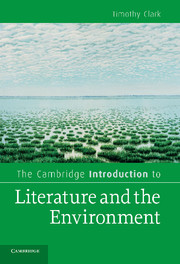Book contents
- Frontmatter
- Contents
- List of illustrations
- Preface
- Acknowledgements
- Introduction
- Romantic and anti-romantic
- The boundaries of the political
- Science and the struggle for intellectual authority
- Chapter 14 Science and the crisis of authority
- Chapter 15 Science studies
- Chapter 16 Evolutionary theories of literature
- Chapter 17 Interdisciplinarity and science
- The animal mirror
- Notes
- Further reading
- Index
- Cambridge Introductions to …
Chapter 16 - Evolutionary theories of literature
Published online by Cambridge University Press: 05 June 2012
- Frontmatter
- Contents
- List of illustrations
- Preface
- Acknowledgements
- Introduction
- Romantic and anti-romantic
- The boundaries of the political
- Science and the struggle for intellectual authority
- Chapter 14 Science and the crisis of authority
- Chapter 15 Science studies
- Chapter 16 Evolutionary theories of literature
- Chapter 17 Interdisciplinarity and science
- The animal mirror
- Notes
- Further reading
- Index
- Cambridge Introductions to …
Summary
On the whole environmental criticism is defined more by its issues and challenges than by any particular method. There is, however, a small but striking body of work that attempts to offer an approach to literature from the viewpoint of Darwinian evolutionary science. This means to confront directly the enormous, fraught meta-contextual issues that others sometimes evade: can literature be understood in terms of human evolution? What is human nature? Are there biological bases for morality, or even for aesthetic judgement? Such questions knowingly transgress deep boundaries between the humanities, social sciences and natural sciences, finding such boundaries often anachronistic and misleading.
It is not just a matter of particular arguments or issues in one discipline seeming dubious when viewed from the perspective of another, but of alleged falsities in the ways the disciplines are constituted. Glen Love sees thinkers in the humanities and social sciences as working ‘for the most part, as if the monumental discoveries of Darwin and his followers had never taken place, as if we are “above nature”’. For Love this aligns ‘many humanists with creationists, backwoods school boards, and others whose efforts are devoted to not wanting to know what is true’.
The Standard Social Science Model
Evolutionary critics would argue against almost all contemporary literary criticism, seeing it as an offshoot of the now suspect assumptions still used to differentiate the social sciences and humanities from the natural sciences. These assumptions form the so-called ‘Standard Social Science Model’.
- Type
- Chapter
- Information
- The Cambridge Introduction to Literature and the Environment , pp. 165 - 170Publisher: Cambridge University PressPrint publication year: 2011

